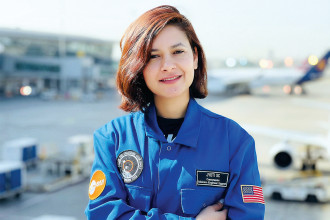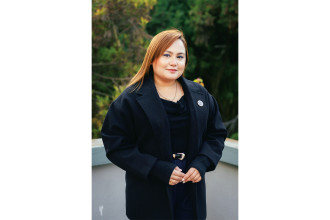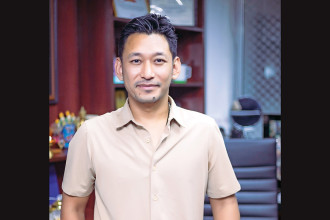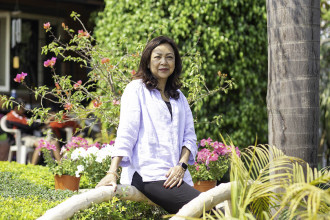
Shiva Dhakal
Founder, Community Homestay Network
My journey has taught me that success is not about where you start, it is about how you adapt, learn and give back. From a teenage hotel worker to an entrepreneur leading multiple ventures, my story has been one of resilience and purpose. The Community Homestay Network today stands as a model of inclusive tourism, one that benefits both travellers and locals while keeping Nepal’s cultural identity alive
The pioneer of the Community Homestay concept in Nepal, Shiva Dhakal has broken every stereotype about what one can achieve through perseverance, humility and vision. For many who once believed that a ‘random guy’ from a ‘multiple campus’ background would have limited opportunities in life, Dhakal’s journey stands as a powerful counterexample. From humble beginnings, he has gone on to become one of the most respected figures in Nepal’s hospitality and tourism sector. His story is not just one of personal success, it is also about how business, when driven by purpose, can uplift communities and create long-lasting change.
Dhakal’s professional journey began in modest circumstances. His first job was at a small hotel, where he learned the basics of guest service and hospitality. A few months later, he moved to a shop that rented trekking jackets and shoes to travellers. This experience, though seemingly simple, shaped his understanding of the tourism ecosystem. It was here that he realised a key lesson that before selling services to tourists, one must first understand them. This curiosity about travellers’ motivations, preferences and experiences became the foundation for his lifelong career in tourism. After a year-and-a-half, he joined a travel company, working under the supervision of an experienced manager. That exposure gave him valuable insight into how the travel industry functions from the inside.
With time, Dhakal developed the confidence and ambition to start something of his own. He established Royal Mountain Travel, a company that combined his deep local knowledge with his growing understanding of global tourism trends. But as the business grew, he began to feel that simply managing profit and loss was not enough. “I wanted to create something that gave back to the community,” he recalls. This desire led to the birth of the Community Homestay Network (CHN), an initiative that would transform rural tourism in Nepal by connecting travellers directly with local families. Today, Dhakal’s entrepreneurial portfolio also includes two boutique hotels, AVATA - a wellness company managed by his wife, and Bricks Café - a popular dining space that celebrates Nepali flavours and culture. For Dhakal, each of these ventures is part of a broader vision, to elevate Nepal’s hospitality industry while ensuring that the benefits of tourism reach those at the grassroots.
In this edition of Business 360, Dhakal speaks about the five things that have had a profound effect on his life personally and professionally.
Turning setbacks into opprtunity
My life took a decisive turn when I was just 17 years old. I grew up in a large family but certain circumstances forced me to make an early and difficult choice, between continuing my education or earning a living. I had to choose between studying and working. I chose the latter. It was my only option, my last resort.
Many might have seen that as a setback but I saw it as an opportunity. My first few years in tourism opened my eyes to the world. I met people from all walks of life, travellers with different perspectives, stories and experiences. Trekking with them through Nepal’s diverse landscapes, sharing food and camping under the stars helped me see my country through their eyes.
Those experiences changed me. They taught me what travellers truly value: authenticity, warmth and meaningful human connection. Tourism gave me confidence. It helped me build networks, learn from people and discover new ways of doing things.
What started as a necessity soon became a lifelong passion. More than three decades later, I am still here, still learning, still loving every moment of it. Today, I am proud to be among the pioneers of the Community Homestay Network in Nepal. For me, it is not just a business model, it is a way to empower communities and connect cultures.
The power of we
If I look back, my story is really about collaboration. I never had a formal business plan. Everything we have achieved so far has come from practical experience rather than textbooks. My real education came from the field, by attending conferences, meeting people, observing trends and finding ways to fill the gaps I saw in the market.
As Royal Mountain Travel grew, and later the Community Homestay Network, so did my team. Our strength has always been our people. We have brought together experts from marketing, finance, tourism and hospitality but more importantly, we have built a culture of learning and trust.
From the beginning, I believed in giving opportunities to freshers who had passion, even if they did not have experience. Hospitality, to me, is an industry that rewards attitude and commitment more than qualifications. Many of those young people we hired years ago are now doing exceptionally well in their careers.
Our company culture is open and inclusive. Many of my employees have been with me for over two decades, a rare thing these days. Freedom and transparency are our core values. Everyone, from guides to office staff, knows that their voice matters. That sense of belonging has been key to our long-term success.
Adaptability has also played a big role. Over the years, we have embraced technology and digital tools, evolving with global tourism trends. We built our team slowly but kept learning and adapting along the way. That is how we have managed to stay relevant and competitive.
Trust is our greatest asset
One of the biggest lessons I have learned in life is that honesty really is the best policy. But that realisation came through experience. In my early days as a guide, it was common practice to overcharge tourists. Everyone did it and I thought it was just how things worked. Then one day, a man named Renes Shrama from the Netherlands saw me overcharging a tourist and called me out. He said, “If this tourist finds out you cheated him, he will leave with a bad impression of Nepal and Nepalis. He may never come back and he will tell others not to visit either.” His words struck me deeply. That moment became a turning point in my life. I realised that short-term gain can never outweigh long-term reputation. From that day on, I decided that every.
I still share this story with young guides and employees because I believe honesty is not just a moral choice, it is good business. Today, that principle forms the backbone of all my ventures: Community Homestay Network, Royal Mountain Travel, Bricks Café, AVATA, my boutique hotels, and Inside Himalayas magazine.
Our clients trust us because they know we operate with transparency. That trust is our greatest asset.
A lifelong learner
Even though I do not have a strong academic background, I consider myself a lifelong learner. I love reading, mostly non-fiction, especially biographies and books on leadership. Two books that really influenced me are ‘Looptail’ by Bruce Poon Tip and ‘Eat That Frog’ by Brian Tracy. I also listen to podcasts and read digital books to stay up to date. Digital platforms have truly turned the world into a global village giving us access to knowledge and opportunities that were once out of reach.
I could not pursue higher education but I understood its importance early on. My wife, Shobita, on the other hand, continued her studies with remarkable determination. After completing her ISc in Microbiology, she went on to earn her Bachelor’s, Master’s, and PhD in the same field, all while managing our family. Her motivation was our children. We both wanted them to have access to good education and she knew her academic background would help make that possible. Today, she manages AVATA, our wellness company. Being a microbiologist, it is a field that fits her perfectly. Before AVATA, she worked at the Teaching Hospital, and now this has become our shared passion, a space that brings joy and purpose to our family. Our dinner conversations often revolve around AVATA and its growth. Our kids are also getting interested. In many ways, it has become a family project. I have always believed that women make better leaders, their empathy, attention to detail and resilience bring balance to leadership.
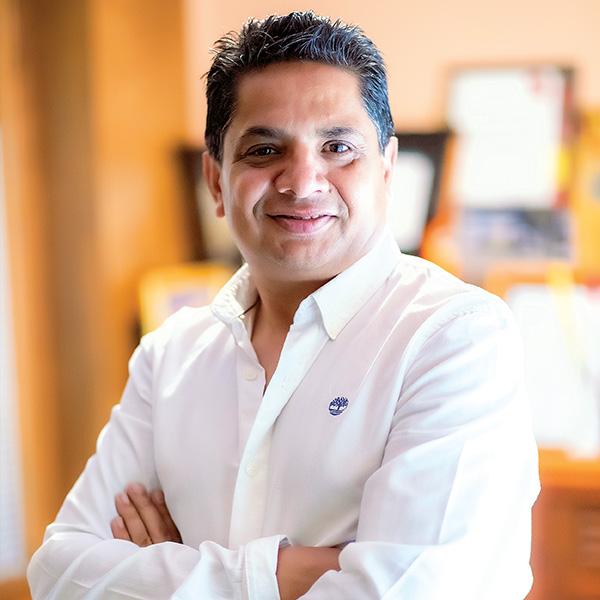
There is still a lot more to do for Nepal’s tourism sector. I want to take things slowly, one step at a time, focusing on building sustainable systems that empower people and communities.
Empowering people and communities
One of the things I am most proud of is how our work has created opportunities for women in Nepal’s hospitality sector. In many countries, women lead the tourism industry but in Nepal, men still dominate most roles. That imbalance motivated me to promote women-led entrepreneurship through the Community Homestay Network.
I remember an incident that made me think deeply about this. A journalist from Lonely Planet once visited our office and was surprised to see that our security guard was a woman. It was so unusual to him that he took a photo and shared it online. That moment reminded me that even small changes can challenge perceptions.
A great example of this transformation is in Panauti, a historic town near Kathmandu. Years ago, tourists would visit but never stay overnight because there were no accommodations. I approached a local family and suggested they open their home to visitors. With just two beds, a few bedsheets and basic amenities, Nepal’s first community homestay began.
I told the family to think of it as an investment, even buying two new bedsheets could yield returns. That small step changed everything. The initiative succeeded and others followed. Today, 17 women entrepreneurs in Panauti run their own homestays under the Community Homestay Network.
They do not just provide lodging, they offer real cultural experiences: teaching tourists how to make momo, craft Nepali handicrafts and participate in local traditions. When tourists go back home and teach their friends how to make momo, that is cultural exchange in its truest sense. That is how Nepal’s culture travels across borders.
For me, this is what sustainable tourism really means, empowering local communities, preserving traditions and connecting people through shared experiences.
My journey has taught me that success is not about where you start, it is about how you adapt, learn and give back. From a teenage hotel worker to an entrepreneur leading multiple ventures, my story has been one of resilience and purpose. The Community Homestay Network today stands as a model of inclusive tourism, one that benefits both travellers and locals while keeping Nepal’s cultural identity alive.
There is still a lot more to do for Nepal’s tourism sector. I want to take things slowly, one step at a time, focusing on building sustainable systems that empower people and communities.
In every venture I lead, Royal Mountain Travel, AVATA, Bricks Café or the Community Homestay Network, I try to blend business with purpose. My story, I believe, proves that vision and integrity can turn even the simplest beginnings into something truly meaningful.



